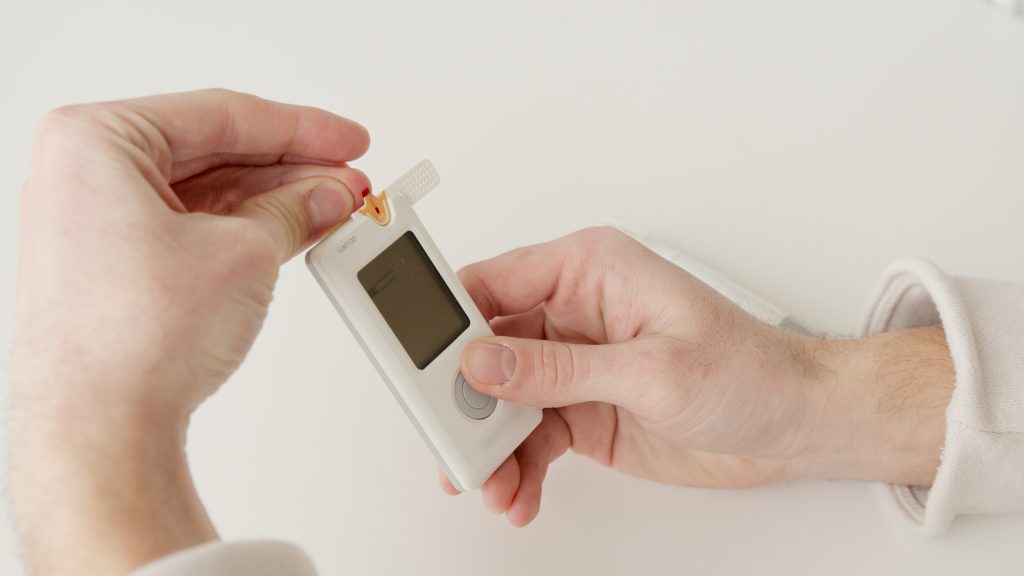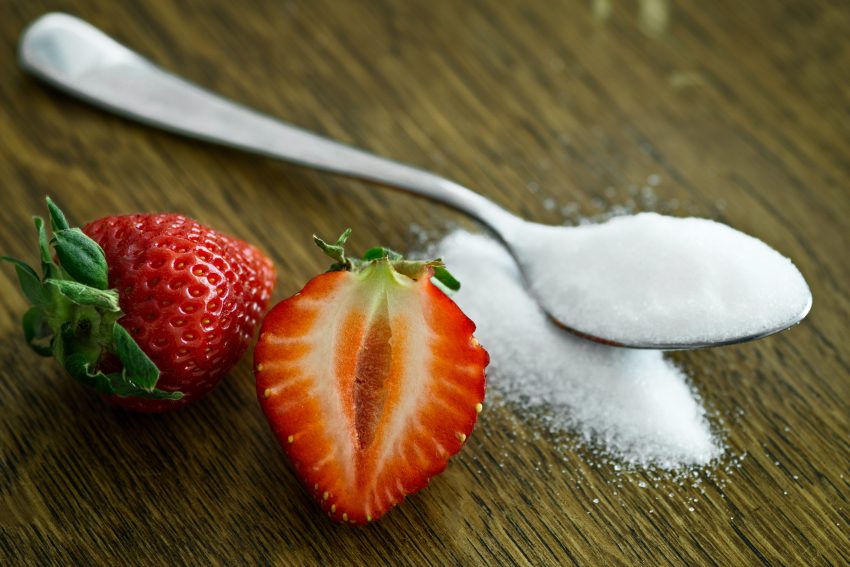In today’s fast-paced world, sugar has permeated our diets, often hidden in processed foods, beverages, and even seemingly innocent snacks. While sugar provides a quick burst of energy and indulges our taste buds, the dark side of this sweet delight becomes evident when consumed in excess. This article delves into the impacts of processed sugar on the body, offers insights on monitoring sugar levels, and provides actionable tips to reduce sugar intake for better health.
The Bitter Truth – How Processed Sugar Affects Your Body
Blood Sugar Rollercoaster: Riding the Glucose Highs and Lows
In its refined form, processed sugar is rapidly absorbed by the bloodstream, causing a surge in blood glucose levels. This sudden spike triggers the release of insulin, a hormone responsible for regulating blood sugar. As a result, glucose is quickly transported to cells for energy or stored as glycogen in the liver and muscles. However, this swift rise in blood sugar is often followed by a steep crash, leaving you feeling tired, irritable, and craving more sugar to regain that temporary rush.
The blood sugar rollercoaster can lead to energy fluctuations throughout the day, impacting your productivity and mood. Over time, this cycle of spiking and crashing blood sugar levels can contribute to insulin resistance and increase the risk of developing type 2 diabetes.
Weight Gain and Obesity: The Hidden Calories
Sugar-laden foods may be irresistibly tasty but have a hidden cost: empty calories. These calorie bombs lack essential nutrients, leaving you unsatisfied and inclined to overeat. Moreover, sugar stimulates the release of dopamine, the brain’s “feel-good” neurotransmitter, making sugary treats highly rewarding and encouraging overconsumption.
Continuous overeating, especially of foods high in added sugars, can disrupt your body’s natural hunger signals, making it challenging to gauge true hunger and fullness cues. The excess calories from sugar that aren’t used for energy are converted and stored as fat, contributing to weight gain and increasing the risk of obesity.
Insulin Resistance: The Onset of Metabolic Chaos
Long-term consumption of excessive sugar can lead to insulin resistance, a condition in which the body’s cells become less responsive to insulin signals. As a result, glucose struggles to enter the cells effectively, leading to persistently elevated blood sugar levels. Insulin resistance not only heightens the risk of type 2 diabetes but also sets the stage for metabolic syndrome—a cluster of conditions that includes high blood pressure, abnormal cholesterol levels, and increased abdominal fat.
To prevent the development of insulin resistance, it is crucial to moderate sugar intake and maintains a balanced diet rich in whole foods, complex carbohydrates, and fibre.
Inflammation and Chronic Diseases: Sweet Fuel for Health Hazards
The inflammatory response is a critical defence mechanism by the immune system to protect against harmful invaders. However, chronic inflammation, triggered by excessive sugar consumption, can lead to detrimental health effects. Sugar stimulates the production of inflammatory cytokines, molecules that can contribute to systemic inflammation when present in excess.
This chronic inflammatory state is associated with an increased risk of various chronic diseases, including heart disease, certain types of cancer, and fatty liver disease. Reducing sugar intake and adopting an anti-inflammatory diet can help mitigate the risks of these health conditions.
Dental Woes: The Cavity Culprit
The harmful oral bacteria in our mouths thrive on sugar, particularly sucrose and glucose. As these bacteria feed on sugar, they produce acids that attack tooth enamel, leading to dental cavities and decay. Regularly consuming sugary beverages and snacks can significantly compromise oral health, necessitating expensive dental treatments and impacting overall well-being.
To maintain a healthy smile, it’s essential to limit sugar intake and practice good oral hygiene, including regular brushing, flossing, and dental check-ups.
Understand The Impact of Processed Sugar
Understanding the bitter truth about how processed sugar affects our bodies empowers us to make informed diet choices. Reducing sugar consumption and opting for healthier alternatives can lead to improved overall health and well-being, preventing the potential development of chronic diseases and dental problems. A balanced, sugar-conscious approach to nutrition can pave the way to a healthy body.
Monitoring Sugar Levels – Knowledge is Power

Understanding how to monitor sugar levels becomes an invaluable tool in the quest to reduce our sugar intake and make healthier choices. By arming ourselves with knowledge, we can navigate the complex world of sugars and make informed decisions about our dietary habits.
Read Labels: Unmasking Hidden Sugars
When grocery shopping, take the time to read food labels meticulously. Sugar often masquerades under various names, making it essential to know its aliases. Keep an eye out for ingredients like high-fructose corn syrup, maltose, dextrose, sucrose, and other sneaky sweeteners lurking within processed foods.
Understanding the many disguises of sugar empowers you to spot hidden sugars and make conscious choices that align with your health goals.
Track Added Sugar Intake: The Food Journal Advantage
Keeping a food journal can be a powerful tool for monitoring your daily added sugar consumption. Jot down everything you eat and drink, including snacks and beverages, to paint a comprehensive picture of your sugar intake.
Awareness is the first step in making positive changes. By tracking your sugar consumption, you can identify patterns, recognize problematic habits, and find opportunities to reduce added sugar in your diet.
Know Natural vs Added Sugar: Nature’s Sweetness vs Industrial Additions
It’s crucial to distinguish between naturally occurring sugars and added sugars. Fruits, for example, contain natural sugars like fructose, which are bundled with essential nutrients and fibre. While they still contribute to your overall sugar intake, they are healthier choices compared to added sugars found in processed foods.
Added sugars, on the other hand, are sugars and syrups that manufacturers add to enhance the taste of their products. These added sugars provide empty calories and lack nutritional value, making them a prime target for reduction.
Watch Out for Sneaky Sugars: Hiding in Plain Sight
Surprisingly, some seemingly healthy food items may harbour hidden sugars, adding to your daily sugar intake without your awareness. Yoghurt, granola bars, flavoured oatmeal, and even certain condiments can be significant sources of added sugar.
Develop the habit of scanning nutrition labels on supposedly health-conscious products. Opt for alternatives with little to no added sugar, or consider preparing your own homemade versions with natural sweeteners.
By mastering the art of sugar label reading, differentiating between natural and added sugars, and being vigilant about hidden sugars, you take control of your sugar intake and pave the way for a healthier lifestyle.
Reducing Sugar Levels – Savouring Sweetness in Moderation

Armed with knowledge about processed sugar’s detrimental effects and equipped with monitoring techniques, the next step is to embrace practical strategies for reducing sugar levels in your daily life. Moderation is the key, as completely eliminating sugar is not necessary nor realistic for most people. The goal is to strike a balance and enjoy sweetness without compromising overall health.
Gradual Reduction: Baby Steps Towards a Sweeter Balance
Instead of attempting drastic changes overnight, opt for a gradual reduction in sugar consumption. Making small adjustments over time allows your taste buds and mind to acclimate to lower sweetness levels. Replace sugary snacks with healthier alternatives, and gradually reduce sugar amounts in your favourite recipes. This approach will not only be sustainable but also more likely to yield lasting results.
Choose Whole Foods: Nature’s Bounty of Sweetness
Whole foods, such as fruits and vegetables, provide a natural and healthier source of sweetness. They contain essential vitamins, minerals, and fibre, making them a nutritious alternative to sugary treats. Incorporate a variety of colourful fruits into your diet, savouring their natural sweetness guilt-free.
Mindful Swaps: Sweetening Smartly
When sweetening your food and beverages, explore natural alternatives like honey, maple syrup, and dates. While these options still contain sugar, they offer added nutrients and distinct flavours. Stevia and monk fruit sweeteners are non-caloric sugar substitutes that can be useful for reducing calorie intake.
Refined Sugar Reduction: Limiting Processed Foods
Processed foods are notorious for hiding large amounts of added sugars. Limiting your consumption of pre-packaged snacks, sugary beverages, and sweetened treats can significantly reduce your overall sugar intake. Opt for whole, nutrient-dense foods, and enjoy occasional treats mindfully.
Hydration Habits: Be Wary of Sugary Drinks
Sugary beverages like soda, sweetened coffee, and fruit juices are major contributors to excessive sugar intake. Choose water, herbal teas, or infused water as your primary hydration sources. For a refreshing twist, infuse water with slices of citrus fruits or fresh herbs.
Savory Over Sweet: Diversifying Your Tastes
Train your taste buds to appreciate savoury and less-sweet flavours. Experiment with herbs, spices, and umami-rich ingredients to create delicious meals that don’t rely on added sugars. Learning to savour diverse tastes can elevate your culinary experience and open up a world of flavorful possibilities.
The Way Forward
By applying these practical strategies, you can take charge of your sugar consumption, supporting your overall health and well-being while still savouring the sweetness that life has to offer. Remember, every step towards reduced sugar intake is a step towards a healthier and more vibrant life.
Processed sugar may entice our taste buds, but the bitter truth lies in its adverse effects on our bodies. From causing blood sugar rollercoasters and weight gain to fostering inflammation and dental issues, the harmful impacts of excessive sugar consumption cannot be ignored. However, armed with knowledge, we can empower ourselves to make informed choices and take control of our sugar intake.
By monitoring our sugar levels through label reading, food journals, and distinguishing between natural and added sugars, we gain valuable insights into our dietary habits. Armed with this knowledge, we can embark on a journey towards reducing our sugar intake and embracing a more balanced approach to sweetness. Gradual reductions, mindful swaps, and focusing on whole foods allow us to savour the goodness of nature’s sweetness while nourishing our bodies with essential nutrients.
Remember, moderation, not deprivation, is the key. By making mindful choices and finding pleasure in a diverse array of flavours, we can create a sustainable and enjoyable approach to nutrition. With every step taken towards reducing processed sugar, we pave the way for a healthier, happier, and more vibrant life—one that thrives on the abundance of nature’s sweetness and the joy of balanced indulgence.





